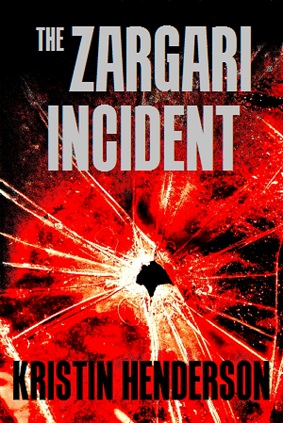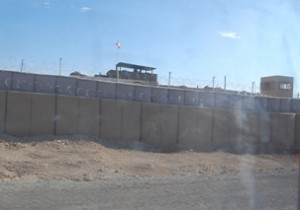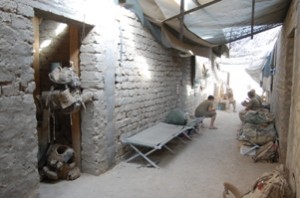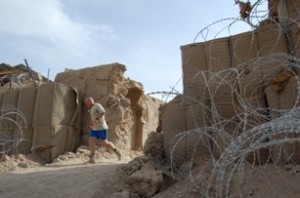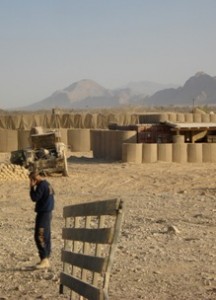THE ZARGARI INCIDENT
|
NEW RELEASE: A Barnes & Noble “NOOK First: Compelling Reads from Emerging Authors” selection |
|
SUMMARY During a rocket attack on a military base in Afghanistan, the graveyard of empires, a young American diplomat isn’t running for the bunker. He’s in bed with a missionary aid worker. Sonny Sonnenfeld is a foreign service officer with the U.S. Agency for International Development. He’s been posted to a strategic but forgotten corner of war-torn Afghanistan where he’s the sole civilian representative of the U.S. government and its money. Clara Santos is the sole aid worker still brave enough– or crazy enough– to stick it out in this violent backwater province. She’s a beautiful, conflicted woman and Sonny has fallen for her hard. Then Clara goes missing in Zargari, a godforsaken desert town crawling with insurgents and drug-runners. What she was doing down there, no one knows. Armed only with his wits and an iPod loaded with jazz, Sonny plunges into a desperate search for Clara. From dusty forward operating bases to a garish narco palace to a lonely Silk Road ruin, Sonny uncovers the plots and counter-plots swirling around Clara’s disappearance. His survival depends on knowing who to trust. But he quickly learns that in a murky war zone like this one, cold-blooded killers and con-men can be heroes and anyone can be the enemy — Marines, insurgents, his own Afghan colleagues, a druglord wearing makeup and bling, and most especially a cross-dressing, rifle-toting American businesswoman who’s playing a very deep game. Even as he’s drawn to her, Sonny trusts her least of all. He’s forced to wrestle with his own best and worst instincts in this page-turning thriller that wrestles with the dark complexities of America at war. The labyrinth of conspiracies and betrayals in journalist Kristin Henderson’s debut novel is made vividly real by her experience reporting with Marines and diplomats in Afghanistan. In the end, on a velvety green wheat field surrounded by endless acres of opium poppy, Sonny’s dogged pursuit of the truth erupts in both betrayal and redemption. |
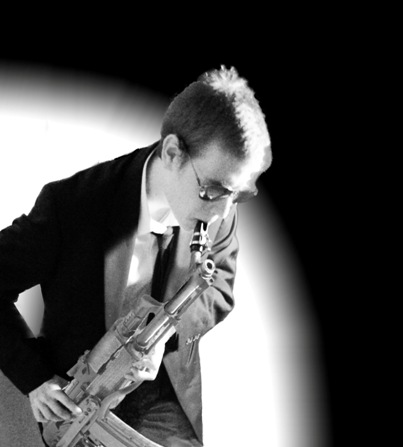
|
|
EXCERPT from The Zargari Incident: Inside the druglord’s compound, the only unarmed man in sight had the bushy beard of a pirate and the arrogant forbearance and diction of a British butler: “The commandan regrets to keep you waiting, however at the moment he is beating someone.” Sonny chose to look understanding. “I’m sure he’s a very busy man.” The pirate butler inclined his head in polite assent. Sonny explained that in any case, there was no need to disturb the commandan as this wasn’t an official visit, just an informal social call on one of the commandan’s guests. He left out the part about the guest knowing something about Clara. But all the pirate butler said was, “The commandan will be with you shortly. If you will be so good as to come with me.” They were only halfway to the guest house before a sinuous, clattering pack of armed men came around the corner of a tiled garden wall. At their head charged Commandan Qajeer. Sonny felt one of his bodyguards step closer while the other stepped back, standard procedure whenever a threat appeared. Qajeer was a short man with a larger-than-life face. Beneath a silk turban, traditional kohl outlined his eyes and intensified his gaze. A pointy, demonic little beard accentuated the jut of his jaw. A crisp, white tunic and trousers highlighted his bronzed skin. A silver pistol gleamed from a gunslinger’s belt that curved below his belly. He smiled with all his teeth and waved his arms. “Welcome, welcome!” he shouted. His cologne preceded him. “Welcome Mr. Sonnenfeld! Welcome USAID!” He seized Sonny’s hand and pumped his arm. “Welcome America!” Sonny pumped Qajeer’s hand in return. “Asalaam aleikum!” Qajeer gasped, “You speak our language?” Giggling with delight, he spun around to the men behind him and rattled off something in Pashto. He spun back. “Waleikum asalaam!” He began propelling Sonny onward in the direction of the guest house. “I know what you must do!” “What must I do?” “You must build a business park at the airport. Pave the runway. Extend it! I will help you!” “You’re too generous.” “It’s nothing. It’s not even worth mentioning. Mr. Sonnenfeld, do you know who owns all the land around the airport?” “Who?” Sonny asked, though he could guess the answer. With a giggle, Qajeer pointed to himself. “No kidding.” “Yes. Yes, it’s true. I will give you as much land as you need. So. You will take it?” “I admire your civic mindedness, Commandan-sa’ab” — though Sonny knew perfectly well that the main benefit of a longer runway was bigger planes that could carry more heroin — “and I wish it were that simple. But this is the government we’re talking about.” “Aah, of course.” The commandan simpered and winked. “How much shall I pay you to accept my offer then? Just name your price.” Sonny told him the issue wasn’t one of price, but rather the bureaucratic process involved in an infrastructure project of that magnitude, which he began to explain. Qajeer became instantly bored. His beringed fingers brushed at a reddish smear on his white sleeve that looked to Sonny suspiciously like blood. While Sonny talked of planning committees and review boards, he glanced over Qajeer’s head at his men. He saw more eyes ringed in kohl, intense and appraising. He saw hands stroking weapons, casually slung. An eerie palace guard of killer coquettes; they all wore stylish shoes. He offered them a firm explanation of environmental impact studies and requests for bids and lowered his eyes back to Qajeer. “So unfortunately, Commandan-sa’ab,” Sonny concluded, “it’s a long and complex process.” Qajeer stared up at him as if weighing the price of a soul against the price of the combustibles needed to burn it. “You are a very shrewd negotiator, Mr. Sonnenfeld.” Sonny kept his face pleasantly blank, certain that wasn’t all Qajeer had to say. “And I?” Qajeer shrugged. “I am indeed a very generous man.” His grin, sudden and false, split his devilish beard. “But I am not a patient one.” Sonny left Commandan Qajeer handing out candy to an adoring gaggle of children. If they were all Qajeer’s, the commandan had been a busy man. Then Sonny left his two security guards, his shoes, and his flak at the guest house door. He pulled a small bottle of anti-bacterial sanitizer from his pocket and vigorously rubbed his hands clean… |
|
PHOTO GALLERY for The Zargari Incident Although The Zargari Incident is a work of fiction, Kristin’s novel is grounded in her reporting in Afghanistan for The Washington Post Magazine. |
|
READER REVIEWS “The combination of the action plus details and characters that were rich and real kept me turning the page. I finished it at 1:00 a.m. and woke up this morning with so many ideas I wanted to discuss with my book group, that I’m making it my selection for the next time I host.” ~ Amazon.com reader “The Zargari Incident engages you from the first sentence and takes you on a roller coaster ride of emotion and excitement.” ~ Barnesandnoble.com reader “Henderson includes enough believable twists to keep you (and Sonny) guessing about who did what right up until the end.” ~ Goodreads.com reader “I came away from the book not just thoroughly entertained but with a greater understanding of the complex forces at work in a country where there are no easy answers.” ~ Smashwords.com reader “Good suspense novel set in Afghanistan…Henderson describes the local people and the countryside so well (she’s been there)…” ~ Goodreads.com reader |
|
READER’S GUIDE for The Zargari Incident Q&A WITH KRISTIN HENDERSON, Q: You were one of the first to write in-depth about the hidden lives of military families after 9/11. Same with the military-civilian divide in this country, chaplains in Iraq, and the civilian surge in Afghanistan. After so many news magazine cover stories and two nonfiction books, what inspired you to turn to fiction and write a novel? KH: I’m a fan of thriller writers like John le Carre and Frederick Forsyth. When you read them and then read the news it’s clear that fiction and nonfiction are just two different ways of getting at the truth of something. In The Zargari Incident, I’m taking the reader on a wild ride through the new American way of war. That’s an issue I first explored in two nonfiction articles, one about the first Marines in an abandoned Afghan town, and another about the civilian surge in Afghanistan. But while the novel is also set in Afghanistan in wartime, it goes beyond its setting to explore timeless human issues — the urge to protect the people you love, the need to see justice done, the struggle to do the right thing when you’re not sure what the right thing is. Those are issues we face as individuals and as a nation. They’re not limited to any particular time or place. So while the war zone setting is exotic, in between the action this is also a personal story that hits close to home. Q: Was writing the novel different from writing the nonfiction articles? KH: The rules and deadlines of nonfiction reporting set limits for you as a writer, they give you structure. There’s so much more freedom with fiction, so many more creative choices to make, that it can be overwhelming. But in some ways the two are the same. I’ve always used the storytelling techniques of fiction to tell compelling true stories. The difference is, with nonfiction you can’t change the facts of what happened, even minor ones. If it was a sunny day, you can’t say it was raining, even it would suit the mood of the moment better. With fiction, you’re completely free to change it up as long as it’s still believable. So with the novel I had the freedom, for example, to create a monster dust storm that’s raining mud and throw it at my hero at a crucial moment. These storms are real, they really happen that way, but being able to time it like that takes the story to a level of hyper-reality that’s incredibly dramatic and yet still believable. Q: That’s what makes the novel so powerful: The Zargari Incident feels like the true story behind the headlines, in part due to your journalist’s eye for the telling detail. It’s rich with detail — the smell of a forward operating base, the sound of an incoming rocket, the taste of dust out on a convoy. It’s clear you did a lot of research. KH: I did, including a month on the ground in Afghanistan. I interviewed experts in Kabul and Kandahar and followed Marines and USAID and State Department civilians around Helmand province. This was back in 2008, when Iraq was still getting all the coverage. I’ve always been drawn to off-the-beaten-path stories, the kind of stories that give me and the reader something new to discover. Back then, the whole country of Afghanistan was off the beaten path. Almost no one was paying attention to the increasingly nasty fight there, much less the few USAID civilians who were out in the field. There were so few reporters on the ground that I got amazing fly-on-the-wall access, watching the Marines and U.S. government civilians struggle to implement what, at the time, was this new doctrine called stability operations. The challenges they faced every day were eye-opening, things I hadn’t heard being discussed in the general media, and yet this was shaping how America operated in the world. Q: So is there a message you’re trying to send with this book? KH: No, whether you’re talking about Afghanistan or any other troubled part of the world, politically, militarily, there are no easy answers. So there’s no message in that sense. I mean, like most people, the less I know about something the more opinionated I am. But as I research a story, I start to see all the complexities and nuances. As I was writing this novel, I was inhabiting each character, essentially acting on the page and seeing the world through their eyes — Americans, Afghans, Marines, civilians, spies, good guys, bad guys. They’ve all got a different take on it, and each one makes sense to me in its own way. So I’m wrestling with the issues through these characters and I trust my readers to do the same. Q: Speaking of the characters, your hero, Sonny Sonnenfeld, is not your typical action hero. A woman gives him an ass-kicking and his only weapon, a pocket knife, gets used on him. How did you arrive at a hero like Sonny? KH: Well, he does get to whup up on one of the bad guys! But it’s true that he’s not the kind of guy who goes around kicking in doors. He wins by figuring out how to out-manuever whoever he’s up against. I wanted a hero I could relate to, and Sonny has a quintessentially American soul. Intellectually he knows he doesn’t have all the answers, but deep down he still kind of believes he does. He knows he can’t single-handedly save the Afghans he’s come to care about, but he would dearly like to try. That’s a deep part of our collective self-image as Americans — the self-reliant hero in the white hat who can’t shake the feeling that it’s up to him to ride to the rescue. But between the first page and the last, Sonny learns a lot — about Afghanistan, and maybe more importantly, about himself. DISCUSSION QUESTIONS 1. 2. 3. 4. 5. 6. 7. 8. If this book inspired interesting questions in your own mind or among your discussion group, email your suggested discussion questions to Kristin so they can be shared here. INTERESTED IN READING MORE? Read Kristin’s articles on Afghanistan, published in The Washington Post Magazine: Ghost Wars by Steve Coll and Little America by Rajiv Chandrasekaran — Together, these two books by seasoned war correspondents tell the story of America’s involvement in Afghanistan, from the years following World War II to the present. Descent into Chaos by Ahmed Rashid — A veteran Pakistani journalist offers a blistering critique of American policy in Afghanistan, as well as USAID and Pakistan’s inscrutable intelligence service. Opium Season by Joel Hafvenstein — A development contractor recounts working on USAID projects in southern Afghanistan a few years after the Taliban fell. Seeds of Terror by Gretchen Peters — An investigation of how drug profits are bankrolling terrorist organizations. The Punishment of Virtue by Sarah Chayes — The one-time NPR reporter covered the fall of the Taliban, then stayed on in Kandahar to help rebuild the country. An insider’s look at the complexity of surviving in Afghanistan. A Rope and a Prayer by David Rohde and Kristen Mulvihill — The Pulitzer Prize-winning New York Times journalist and his wife describe their 7-month ordeal when he was kidnapped by Taliban insurgents. |





